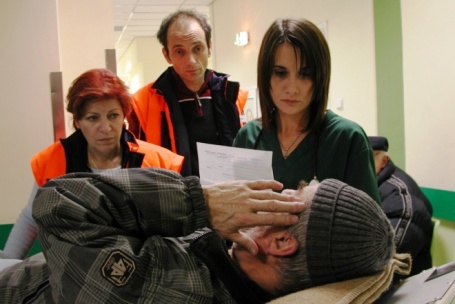 A man’s last hours are spent being moved from hospital to hospital within the maze of the Romanian health care system, in this devastating portrait of mortality and disregard from 2005.
A man’s last hours are spent being moved from hospital to hospital within the maze of the Romanian health care system, in this devastating portrait of mortality and disregard from 2005.
Throughout its history, cinema has blossomed in various countries or regions at certain times, and since the 1960s we’ve been in the habit of calling these film movements a “New Wave” or something equivalent, after the Nouvelle Vague, the French New Wave that started with Godard and Truffaut and the rest. In the last few decades we’ve seen this happen in Iran, South Korea, and Taiwan. In the 2000s a Romanian “New Wave” began that is still in full swing. And one of the first and most important features from that movement is a movie called The Death of Mr. Lazarescu, directed by Cristi Piuiu. With this film, Romania was suddenly on the map of international cinema. And after its success, a whole group of Romanian directors followed with their own innovative works.
The Death of Mr. Lazarescu was one of the most unlikely successes you could imagine. We follow the title character, played by Ioan Fiscuteanu, a 63-year-old man living alone in an apartment building, from the time he first starts to feel pain in his stomach and his head, through a long journey into the Romanian health care system. First he asks for help from his neighbors, who eventually call an ambulance for him while criticizing how dirty his apartment is and saying he should get rid of his three cats. After a lengthy examination by the nurse who comes in the ambulance, she decides that Mr. Lazarescu needs to go to the hospital. The first one they go to is too crowded, and the emergency intake doctor is rude and patronizing. Throughout the night, a succession of people smell alcohol on the patient’s breath and proceed to lecture him about drinking. He had ulcer surgery fourteen years earlier, and they all say, why did you drink after ulcer surgery? That’s just one detail of a long process in which the callous attitudes of the doctors and assistants, along with their obviously overworked status and understandable preoccupations, form a grim and darkly comic contrast to the innocent, bewildered patient, who was a vivid personality in the beginning of the film but gradually disappears underneath all the forms, procedures, and hospital workers.
One of the more brilliant strokes in this film is the title, which tells us that Mr. Lazarescu is going to die. I understand that the original Romanian title is just his name. Well, whoever changed it to The Death of Mr. Lazarescu added immeasurably to it, because besides being a devastating portrait of the insane health care system, which is what most critics noticed, it depicts something much deeper—the awareness of death in the midst of the chaotic and corrupt social conditions in which it occurs—the utter banality of death, if you will. All the comments, the trivial occurrences and side conversations become strange and almost unbearably intense in the light of one person’s last hours on earth.
After awhile you forget that this is a fiction film. The handheld camera and loose improvisatory feel simulates a documentary approach, but in fact the screenplay, by Piuiu and Razvan Radulescu, scripts everything that happens with razor-sharp precision for an ultimate effect. A film in which we follow a sick older man being shunted about to four different hospitals in a single night, who gradually gets worse from what turns out to be a hematoma in the brain and an enlarged liver, does not sound like the kind of movie you would choose to watch. Against all my expectations, however, I was spellbound throughout this arduous, and yes rather frightening, ordeal of confronting mortality in the midst of general disregard. The Death of Mr. Lazarescu has been called a black comedy, but to me it was practically life-changing, a spiritual experience.

A college professor moonlights as an undercover cop posing as a contract killer, in Richard Linklater’s genial spoof. Austin, Texas native Richard Linklater has...

Riz Ahmed plays a rock drummer who loses his hearing and must come to terms with being a deaf person, in Darius Marder’s moving...

Luca Guadagnino’s lovely film tells of the romance between a 17-year-old boy summering in 1983 Italy with his parents, and a 24-year-old American man...